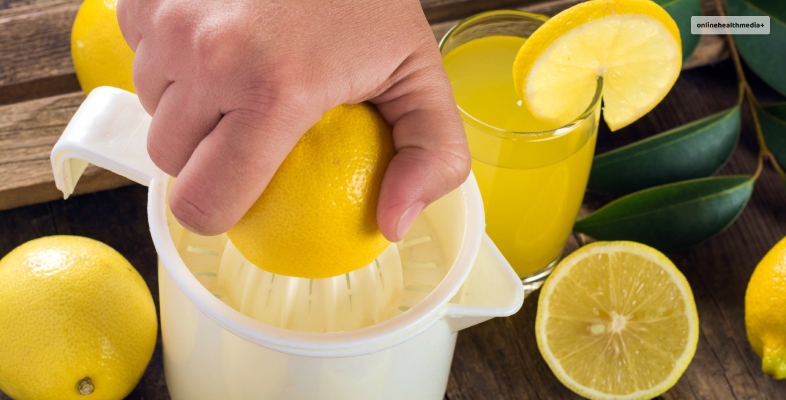Benefits Of Lemon: Why You Should Include Lemon In Your Diet?
Lemon is a citrus fruit with many benefits, including promoting heart, skin, gut health, and teeth whitening. You may benefit from healthy, glowing skin and better control over weight. Lemons have been used in different forms across various cultures and religions.
This species belongs to the evergreen tree, which is native to Asia, especially the northeast part of the Indian subcontinent. This country has been the home of everything related to home remedies, ayurvedic remedies, and cures that are au naturel.
Like all citrus fruits, lemon is an excellent source of Vitamin C and flavonoids, which are remarkable antioxidants. The use of lemon has been noted in desserts, home remedies, syrups, dishes, and even chemical-free disinfectants!
Contents
Lemons: History & A Look At Its Existence
Lemon, the species that belongs to the evergreen family of Rutaceae is predominantly found in China, Northern Myanmar, and Northeast India. The plant finds use in non-culinary as well as culinary purposes. The yellow fruit is best known for its juice which has a plethora of uses.
The rind and pulp of the fruit is also useful for baking or other cooking purposes. It lends a sour taste to the dishes which is due to its composition- it contains citric acid in 5-6% and has a pH of 2.2 which explains the tingling feeling you get when you straight-up taste a lemon. The following section illustrates the top 10 benefits of the fruit that you can reap!
Top Ten Benefits Of Lemon:
You must have heard your friends or elderly relatives list many benefits of lemon. The most common benefits of lemon are improving skin health and removing dandruff when mixed with oil before shampooing your hair.
The additional benefits of this fruit are noted to be due to the great source of Vitamin A, Magnesium, and different Vitamin B (B1, B2, B5, B6, B9), and D. Vitamin B5 is a water-soluble vitamin that aids in the formation of coenzyme A and acyl carrier protein.
1. Antibacterial Effects

Lemon is a superfood that has several benefits, including antibacterial properties. The use of lemon juice for various purposes has been noted for decades. The bioactive compounds that benefit human lives include tannin, carotenoids, terpenoids, limonoids, and flavonoids. All these compounds have a profound effect on bacterial pathogens.
The presence of citric acid (~ 5%) provides this fruit an overall pH of 2-3- making it acidic, which is not preferred by bacterial pathogens for their growth. The presence of this acid is also responsible for its sourness. The low pH of lemon thus makes it an excellent antibacterial as microorganisms such as bacteria require an ambient pH (pH 7) to thrive and replicate.
2. Prevention Of Cancer
The fight against cancer has been extended, as this chronic disease is vexingly tricky to cure. Apart from the advances in science, the side effects of these therapeutic innovations have been severe. Thus, people have opted for non-pharmacological options as an alternative to side effect-inducing drugs. These are those alternative treatment methods that are non-chemical.
These interventions include ingredients such as lemon and ginger, which are shown to have a combined positive effect on the body. One of these benefits was preventing cancer in people through its antiproliferative activity. One such study testing the impact of lemon showed a reduction in tumors.
3. Prevention Of Kidney Stones

The high levels of citric acid in the fruit’s flesh are a significant contributor to this property of lemons, as it doubly increases the citrate levels in the urine, which prevents the development of stone crystals. Four types of kidney stones are observed: uric acid, calcium oxalate, cystine, and struvite. The entire process of kidney stone development is based on the formation of crystals that ultimately outnumber the fluid volume in urine.
The fluid can dilute crystal-forming compounds such as uric acid, calcium, and oxalate, thus preventing the formation of stones. (Reminds you why your grandparents would ask you to drink lots of water!)
Thus, the citric acid content of lemons prevents the crystals from sticking together. The citrate binds to calcium and restricts the formation of kidney stones. Therefore, include a glass of lemon water in your daily routine.
4. Reduced Risk Of Heart Disease
Reducing heart disease is possible through lemons, a rich source of antioxidants and Vitamin C. These two ingredients benefit the heart’s health as it aids in preventing stroke and heart diseases. The risk factors that can lead to the development of heart diseases are eliminated by lemon as it contains several antioxidants such as Diosmin, Hesperidin, and Eriocitrin.
The juice of one lemon in a glass of water can benefit anyone as it will aid in the absorption of Vitamin C, along with several other vitamins and antioxidants that act as promoters of good blood vessel health.
5. Relieves Constipation

Lemons contain high fiber and vitamins such as Vitamin C, known for their water-attracting properties. A characteristic of vitamin C is to pull water into the digestive system (specifically the gut). Here it can be utilized to soften stool as the increased water content stimulates bowel movements.
This property is facilitated through the consumption of fiber particles that promote digestion. The smooth functioning of the bowels as the stool is softened, which can ease the passing of stool. The combination of water and lemon allows the digestive system to be evacuated quickly due to their natural lubrication.
6. Relieves Indigestion
The antioxidants and other nutrition components, such as Vitamin C and other vitamins, allow the production of stomach acids that can facilitate the digestion of food. This property of the lemon has an alkalizing effect on the body, neutralizing the stomach’s excess acid. To reverse the development of acids, try mixing a teaspoon of lemon juice in a glass of water to check if the concoction is suited.
The acidity in lemon can be high for people and may not be suitable. Thus, it is always better to be cautious about these ingredients than suffer the consequences.
There are several benefits of cucumber and lemon water, this includes relieving indigestion. Thus, if you do not like the taste of lemon alone, try adding a few slices of cucumber to your water to make an infused water that has the added benefits of cucumber.
7. Aids In Throat Infection

Vitamin C in lemons is known to have antimicrobial properties due to the presence of various antioxidants. That can lessen the detrimental effects of the bacterial or viral source causing the infection. Most households who practice using lemon and honey in case of a common cold or cough are well-versed in the benefits and efficiency of that drink.
The antioxidants and vitamins help soothe the discomfort felt during a throat infection and, through their antimicrobial property, prevent the growth of the infecting microorganism. The immunity booster helps in fighting off the pathogen (harmful microbes).
The benefits of this superfood can be obtained by mixing the citrus juice with either plain water or reaping the benefits of green tea with lemon. This will provide an added benefit of anti-inflammatory properties that reduce swelling.
8. Relieves Respiratory Disorders
Even though there are scientifically-backed remedies for respiratory distress, there is a shortage of pharmacological alternatives that do not have significant side effects. The use of lemons in this capacity is due to the antiseptic properties that help fight infections restricted to the respiratory system. The nutrients that are obtained from lemon juice help in controlling the triggers of asthma.
Some reports suggest the benefit of lemon juice in relieving symptoms related to lung and bronchial infections. The trick also works in case of steam inhalation. Add a few drops of lemon to a glass of warm water to inhale the vapors.
9. Promotes Absorption Of Iron

The promotion of iron absorption is made possible through the activity of Vitamin C in lemon. This vitamin promotes iron absorption from plant sources so that the body can efficiently absorb and utilize iron. This is achieved by the vitamin for both heme- and non-heme absorption of iron. Studies have shown a drastic change in the absorption of iron by citric acid.
The importance of this citrus fruit is thus more evident in our diet. Be it the benefits of cucumber and lemon water or the lemon and honey in warm water- the nutrients from the lemon will be consumed in the same quantity.
10. Promotes Weight Loss
The use of lemon in one’s weight loss journey has been recorded for quite some time. You must have heard people recommending this superfood for that purpose blatantly. So if you want a boost to your weight loss journey, try using lemon in warm water. From personal experience, it does help in facilitating weight loss when consumed on an empty stomach.
However, be warned that consuming it in large quantities can lead to acidity due to excess acid. Drinking this concoction alone cannot facilitate weight loss. Expect results when you combine a healthy diet and exercise.
The market abounds with tips, tricks, and products aiding the weight loss journey. Some of these products are effective in most cases, whereas some people have been unfortunate not to gain any benefits from these products. Similarly, the benefits of lemon in the weight loss journey are practical for some, and for some, it has no such significant impact.
Tips:
Be careful to exercise caution when using any product- natural or synthetic. Excessing anything is detrimental- even drinking extra water has severe effects! Consuming lemon should first be checked for its impact on your health and continued only when the results are positive.
Never put lemon directly on your face, as it can damage the skin and lead to rashes and redness lasting several days. The citric acid content in lemon is too high to be consumed directly. Use it in its diluted form.
Watch this space for upcoming reviews and the benefits of natural products!
Frequently Asked Questions (FAQs):
Lemon is a fruit that comes from a tree. Lemonade is a drink that can be made with the help of a lemon. The confusion arises when someone is mentioning the fruit type lemonade lemon.” This is a type of lemon that comes after a cross between a mandarin or navel orange and a lemon.
Lemon is a versatile fruit that can be used for cooking as well as non-cooking purposes. From being used in baking to cooking and making mock tails or cocktails- the fruit has been in almost every dish that is sweet. For example, in Europe, there is a very popular drink called the Limoncello. It is a popular Italian after-dinner drink that is made with lemon peels and vodka.
Lemon and lime belong to the same family. However, there is a difference in their genetic traits. Both the fruits share properties such as containing great amounts of vitamin C along with other essential nutrients such as antioxidants, flavonoids and citric acid.
Read more:
- Diet and Foods For Pregnant Women
- 6 Diet Trends And How To Incorporate Them Into Your Lifestyle
- How Effective Is China Slim Tea For Weight Loss? Ingredients, Benefits and More



